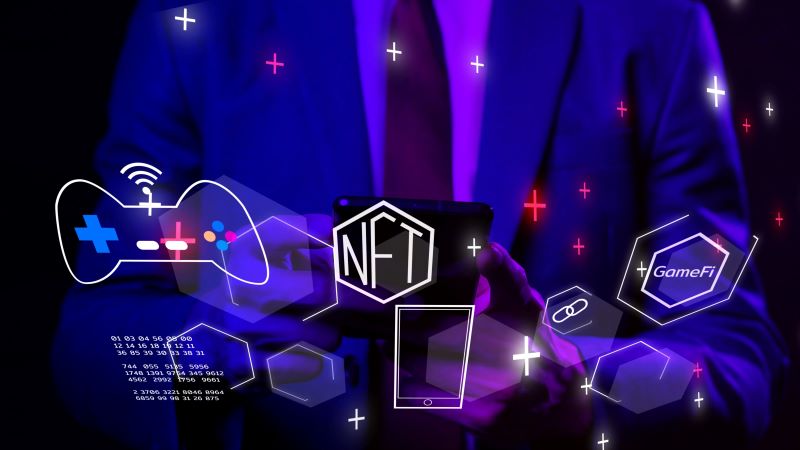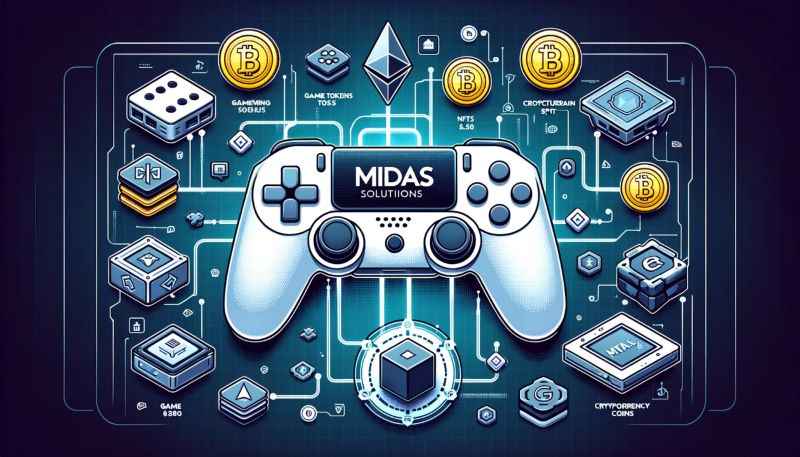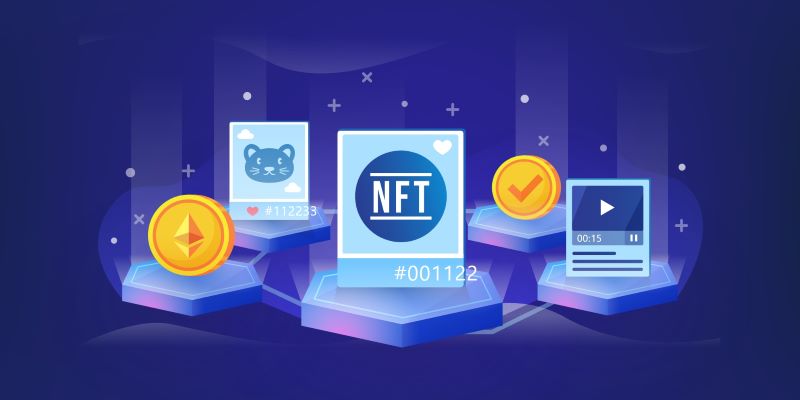GameFi Revolution: How Blockchain Merges with DeFi for Ultimate Gaming
Forget everything you know about gaming. Today’s landscape is changing, and it’s all thanks to how GameFi blends Blockchain and DeFi. I’m here to guide you through this new realm where finance meets fun. Stick around, and I’ll show you a world where playing games can fatten your wallet, not just eat up your time. Welcome to the revolution—a place where cryptocurrency fuels adventures, and NFTs go beyond simple collectibles. Here, the play-to-earn model isn’t just a trend; it’s a growth spurt in digital economies. Your gaming skills can now pave the way for real economic empowerment. Let’s dive in and decode how this fusion is not just altering our play, but also redefining our pay.
Exploring the GameFi Landscape: A Fusion of Gaming and Finance
Understanding Game Finance and DeFi
Let’s dive into how gaming meets finance. I’m talking about something cool called GameFi. It’s like a mix of playing games and smart money stuff, all thanks to blockchain tech. This is big for folks who dream about making cash while having fun with games.
In the world of GameFi, you’ve got game finance and DeFi walking hand in hand. Game finance is all about the digital dollars in games. DeFi, or decentralized finance, is like the wild west of finance, but on the internet. It uses blockchain to let anyone deal with money, lend, and trade without middlemen.
Now, mix them together and boom – you get a game where your virtual wins can mean real-world gains. This isn’t just fantasy. We’re talking about real cash from game skills and smarts. It brings together the best of both worlds. Players own their stuff, make money moves, and shape the game’s future. It’s like having the power of a bank in your game character’s hands.
The Growth of Play-to-Earn Models
Play-to-earn models are changing the game—literally. They let you earn crypto just by playing. Earn in-game, but spend anywhere. Sounds super, right? This idea has taken off fast, and it’s pretty sweet for gamers everywhere.
Think about it. You play, you earn, you own. Every sword swing, race won, or farm tended can fill your digital wallet. Crypto gaming platforms are popping up left and right. They bring new ways to make a buck, and ways to enjoy your favorite hobby even more.
The blockchain gaming industry is buzzing. Every day, more games drop that let you score some dough. These aren’t just any games. They’re built on blockchain, which means they’re fair play and your wins are all yours.
Decentralized gaming ecosystems are the next level. These are whole game worlds where what you do and what you own stays with you—even outside the game. No game over for your hard-earned treasures; they travel with you in the crypto world.
So that’s the scoop. We’re living in a time where game finance and DeFi are hooking up to deliver something extraordinary. It centers around you, the player, with a wallet that gets fatter as you level up. It’s not just fun; it’s finance made fun. And let me tell you, it’s only going to get better as we dream, play, and earn in ways we never thought possible.
The Building Blocks of GameFi: Cryptocurrency and Blockchain Technology
The Role of Gaming Cryptocurrency Tokens
Crypto gaming platforms let you earn gaming cryptocurrency tokens just by playing. These tokens fuel the game’s economy. They offer real value as you can trade them for money. Many games use their own tokens. They can unlock new game features or let players have a say in future game rules.
Tokens change how we think about playing games. This mix between gaming and finance is called “gamified finance”. It lets you earn while you play, which is quite a new idea in the gaming world.
It’s like running a lemonade stand in a video game, but you make real money. Now, who wouldn’t want that? Well, that’s what blockchain gaming industry is bringing to our screens.
The games work on a “play-to-earn” model. This way of gaming lets players make money as they have fun. Games on blockchain keep track of everything in a fair and open way. Your in-game wins are yours to keep and use outside the game too.
Non-Fungible Tokens in Gaming: More Than Just Collectibles
Now, let’s talk about non-fungible tokens in gaming. Many call them NFTs, for short. NFTs are like rare game items you can collect and own for real. Think of them as unique game treasures that can be yours and no one else’s. Yes, exactly like that rare dragon pet or space suit.
NFT gaming assets are big in the virtual economies and crypto world. A sword or magic cape you buy in a game can be sold to someone else. It’s like trading baseball cards, but these are in your video games.
And there’s more. These digital collectibles can be used between different games. Imagine using your favorite game’s spaceship in a totally new game. That’s what we mean by “interoperable gaming assets”.
For players, this feels great; they truly own their rewards. Games that let players earn crypto through gaming are getting popular. You can see lots of people join these games.
Smart contracts in gaming make it all safe and easy. They are like digital agreements that make sure the game rules are followed. These smart contracts keep the game fair for everyone.
So, as we see crypto game investments and gaming defi projects rise, remember this. It’s not just about playing games. It’s about players shaping their world and the value they create. It’s a real change in how we play and profit from games.
In short, GameFi ties play to real-world earning. Players enjoy the game and make real money. This mix of fun and finance is growing fast, changing games for good. And you know what? It’s just the start. The games we grow up with will be part of this new, exciting world.
Driving Economic Empowerment: Earning Mechanisms and Player-Driven Economies
Decentralized Gaming Ecosystems and Their Earning Opportunities
Picture a world where playing games helps pay your bills. That’s not fantasy. It’s real in the blockchain gaming industry. Here, decentralized gaming ecosystems let players earn while having fun. Think of them as playgrounds where every game you win drops some coins in your pocket.
These lands thrive on play-to-earn models. Gamers do tasks, battle others, or complete challenges. And for their efforts? They get gaming cryptocurrency tokens. These tokens hold real-world value. So gaming can fill up your digital wallet and not just kill time.
Earning mechanisms are key here. They decide how gamers get and use tokens. A well-built system draws players in and keeps the virtual economy buzzing. But if it’s a mess? Players leave, and the game world goes quiet. Smart contracts lock these rules down with no room for cheats.
In these spaces, every player adds to the story. They’re not just in it for the journey but for the treasures too. This makes a player-driven economy. And it’s not just talk; it’s changing lives, helping folks make money from their gaming skills.
Yield Farming and Liquidity Mining: New Frontiers in Gaming
Dive deeper, and we hit fresh zones like yield farming in gaming. It’s a twist on a DeFi move. Gamers lock up their tokens for a while. In return, they get more tokens back. The more you play, the more you might earn. It’s like planting seeds in a garden of games.
Liquidity mining is another trail. Here, your tokens mix into a pool. They help make sure others can swap, trade, and keep the game’s economy rolling. Your reward? A slice of the fees from all that swimming money.
These trends are reshaping the gaming dapp platforms. Throw in NFTs, and it’s more than a one-way trip. Players can now own parts of the game world, like rare weapons or land. And trading them can rake in cash as their value swings with the market.
This is the power of defi in video games. It’s a ride that’s taking gamers to new lands of earning. And we’re only just buckling up. From here, who knows what new play-and-earn chances we’ll find? But one thing’s sure: it’s a thrilling time to be a gamer in this evolving gamefi universe.
Sustainability and Interoperability: The Future of Blockchain Gaming
Developing Sustainable Blockchain Game Development Practices
Creating games that last is key. In the blockchain gaming industry, this means we must build with care. Our planet matters, so we choose eco-friendly blockchains that use less power. Teams work together to make games that are fun and fair for everyone. They use smart contracts in gaming so rules are clear and all can trust the game. Let’s think long-term and aim for games that we can play for years to come.
As a blockchain gaming economist, I see developers aiming for less energy use. Games using proof-of-stake, not proof-of-work, are a good step. This change can lower the carbon footprint of crypto gaming platforms. Such moves echo a desire for better practices across all decentralized gaming ecosystems. It’s about fun without harming our future.
Interoperable Gaming Assets and the Financialization of Gaming
Imagine using a sword from one game in another. That’s where gaming is headed. Gaming guilds crypto and defi in video games are making assets that work across many games. This is big for the financialization of gaming. With interoperable gaming assets, players can invest in items that keep value across games.
Non-fungible tokens in gaming, or NFTs, let this happen. These digital collectibles can be traded and used in different games, which is pretty cool. Game finance and DeFi are merging, turning gaming into a way to earn crypto through gaming. It’s not just play; it’s also earn. This is a huge change. It’s making gaming more than a hobby. It’s a way to make something valuable in the real world.
This mix of defi gaming protocols and NFT gaming assets changes everything. It makes each item in a game more than just a toy. It could be a piece of a bigger world, our world. Players can buy, sell, and use their assets in new ways, even outside the game. It’s about playing well and playing smart.
Games that let you do this are growing. New P2E gaming trends show this every day. The idea is simple: make games that connect with each other and the real economy. This helps players feel like they are part of something big. They can see the worth of what they earn and collect. Interoperable assets bring games to life in a whole new way.
In conclusion, games are becoming more than just games. They’re becoming part of how we live and work. They let us play and earn and connect in ways we never could before. The blockchain games we’re building today are shaping the future of play, work, and so much more.
In this post, we dived into the exciting world of GameFi, where gaming meets finance. We explored how games are changing, thanks to stuff like DeFi and new ways to earn in-game. We looked at how game coins and special tokens called NFTs are more than just for fun—they have real value.
We saw how GameFi lets players make money and have a real say in their game worlds. And we talked about cool new ways gamers can earn, such as yield farming and giving out loans in games.
The future of GameFi is bright. We’re working on making these games last long and let players use their game items in more than one game. So, as we keep gaming and earning, let’s enjoy how far we’ve come and get excited about where we’re heading!
Q&A :
What is GameFi and how does it incorporate blockchain technology?
GameFi, a portmanteau of “gaming” and “finance,” refers to the integration of blockchain-based financial systems within digital games. Using blockchain technology, GameFi creates a decentralized gaming ecosystem where players can earn cryptocurrency rewards, own in-game assets as non-fungible tokens (NFTs), and participate in the game’s economy. This model elevates gaming from pure entertainment to potentially lucrative interactions with real-world financial value.
How does DeFi fit into the GameFi industry?
Decentralized Finance (DeFi) is tightly woven into the fabric of GameFi by enabling financial transactions and services to operate without central intermediaries. DeFi components within GameFi can include lending systems, yield farming, staking, and liquidity mining, all within the game environment. Players engage with smart contracts for transactions, fostering a play-to-earn model where their gaming skills can translate into tangible DeFi investments and returns.
Can you earn real money through GameFi platforms?
Yes, players can earn real money on GameFi platforms by leveraging their gaming abilities and the play-to-earn model. Rewards typically come in the form of cryptocurrencies or NFTs that can be traded on various exchanges for fiat currency. However, the actual earning potential can vary significantly based on the game’s economy, the value of its tokens, and market demand.
What makes GameFi different from traditional online gaming?
Traditional online gaming often operates on a centralized system and follows a play-to-win concept, where in-game purchases can lead to competitive advantages. In contrast, GameFi emphasizes a decentralized play-to-earn approach, giving players ownership of in-game assets and the ability to earn through their gaming achievements. The incorporation of blockchain technology also ensures transparency and allows for verifiable scarcity of digital items, altering the economic dynamics compared to conventional games.
Are there risks associated with participating in GameFi projects?
Engaging in GameFi projects comes with certain risks, such as the volatility of cryptocurrency markets, security issues within smart contracts, and the nascent nature of blockchain technology which can lead to unexpected regulatory challenges. Additionally, as the space is relatively new, it may be rife with projects of varying quality and intentions, making due diligence and research critical for anyone looking to invest time or money into GameFi ecosystems.



